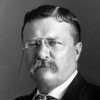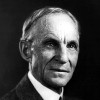“ It is economically most wasteful to accept crippled men as charges and then to teach them trivial tasks like the weaving of baskets or some other form of unremunerative hand labour, in the hope, not of aiding them to make a living, but of preventing despondency.When a man is taken on by the Employment Department, the theory is to put him into a job suited to his condition. ”
Henry Ford, My Life and Work (1922). copy citation
| Author | Henry Ford |
|---|---|
| Source | My Life and Work |
| Topic | hope theory |
| Date | 1922 |
| Language | English |
| Reference | |
| Note | |
| Weblink | http://www.gutenberg.org/cache/epub/7213/pg7213-images.html |
Context
“If the jobs in any one industry or, say, any one factory, were analyzed as ours have been analyzed, the proportion might be very different, yet I am quite sure that if work is sufficiently subdivided—subdivided to the point of highest economy—there will be no dearth of places in which the physically incapacitated can do a man's job and get a man's wage. It is economically most wasteful to accept crippled men as charges and then to teach them trivial tasks like the weaving of baskets or some other form of unremunerative hand labour, in the hope, not of aiding them to make a living, but of preventing despondency.
When a man is taken on by the Employment Department, the theory is to put him into a job suited to his condition. If he is already at work and he does not seem able to perform the work, or if he does not like his work, he is given a transfer card, which he takes up to the transfer department, and after an examination he is tried out in some other work more suited to his condition or disposition.”
source


